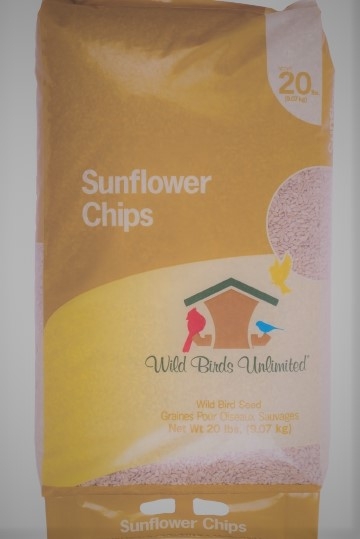The Wild Birds Unlimited Seed Differential
Each of our blends is locally selected to meet the regional and seasonal needs of the birds in your area. We do not include filler grains like oats, wheat, corn and milo that decrease the price per pound of a mix, because these filler seeds are less attractive (or not attractive) to birds. Because there is no wasted seed, our blends actually end up costing less to use while attracting more of the birds that you want to watch.
Seed Blends
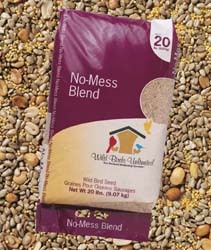 No Mess, No Fuss
No Mess, No Fuss
No shells. No mess. 100% edible. Our No-Mess Blend is great near flower beds, patios and decks. Our unique No-Mess Blend bird seed features seeds that have had their shells removed so only the meat of the seed is left. No hulls on the seeds makes for tidier feeding, since there's no debris on the ground to clean up. Pound for pound, our No-Mess Blend bird seed offers the best value because you do not pay for uneaten seed waste. The birds eat everything.
Available in 10 and 20-lb. bags.
Ingredients: Medium Sunflower Chips, Hulled Millet, Diced Peanuts
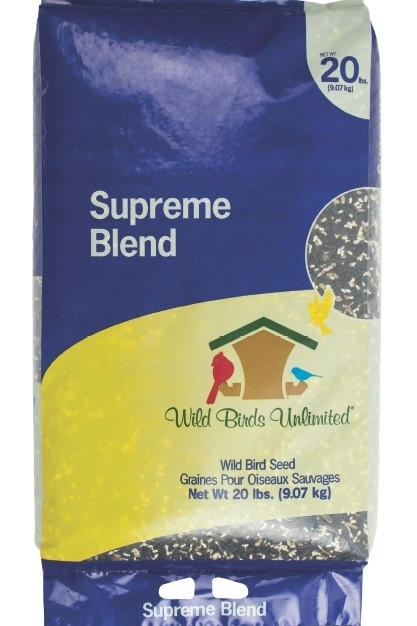 So Good, We Named It Supreme
So Good, We Named It Supreme
Supreme Blend features black oil sunflower, sunflower chips, safflower and striped sunflower in a combination that helps attract a wide variety of birds, such as chickadees, nuthatches, titmice and wrens.
Available in 10 and 20-lb. bags.
Ingredients: Black Oil Sunflower, Sunflower Chips, Safflower and Striped Sunflower
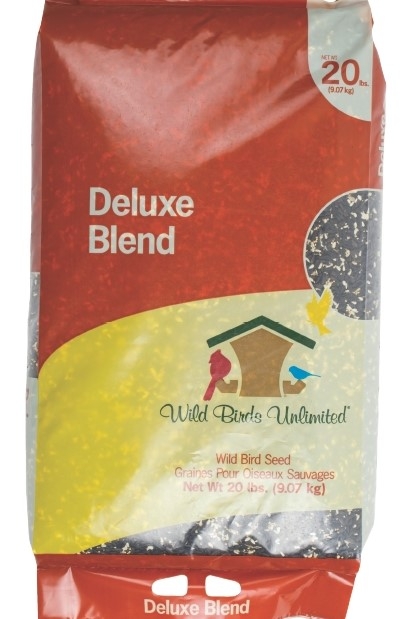 Deluxe Blend: Birds Simply Love It
Deluxe Blend: Birds Simply Love It
Our Deluxe Blend attracts a wide variety of birds. Perfect in our Classic feeder, it features oil sunflower, white millet, safflower and striped sunflower to create a multi-purpose blend that feeds birds at the feeder and on the ground.
Available in 10 and 20-lb. bags
Ingredients: Black Oil Sunflower, White Proso Millet, Safflower, Black-striped Sunflower.
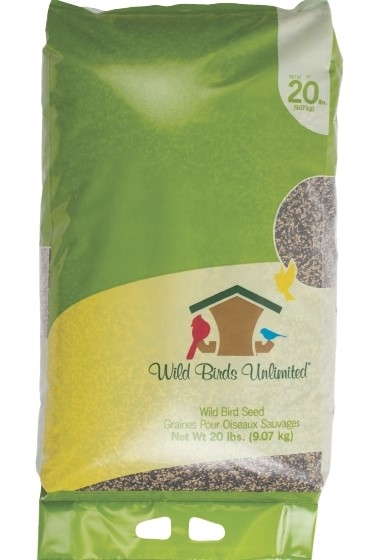 Finch Blend
Finch Blend
Our Finch Blend is a favorite of Lesser and American Goldfinches. Its high oil content is an excellent energy source for active finches. It's best used in our specially-designed finch feeders, and it's critical to keep the food fresh for these picky little eaters. Once seed starts to dry out and become stale, or if it gets a bit wet and gets moldy, finches will turn up their beaks for fresher forage. Store your Nyjer in an airtight container for a longer shelf life and buy in small quantities that will be used up in a few weeks.
Available in 20-lb.bags.
Ingredients: Nyjer® (thistle) and fine Sunflower Chips.
Straight Seeds
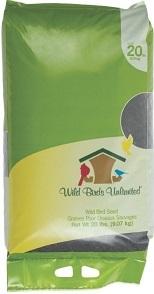 Finicky Finches Need Nyjer®
Finicky Finches Need Nyjer®
Nyjer (thistle) attracts finches of all kinds. Its high oil content is an excellent energy source for active birds and is best used in our specially designed finch feeders. It is important to keep the food fresh for our picky little eaters. Nyjer has a thin shell and is vulnerable to spoilage while in the tube. Once seed starts to dry out and become stale, finches will turn up their beak for fresher forage. Replace Nyjer seed in feeders every three to four weeks if it is not being actively eaten. Store your Nyjer in an airtight container for a longer shelf life, and buy in quantities that will be used up in a few weeks.
Available in 5,10 and 20-lb. bags.
Fill 'Er 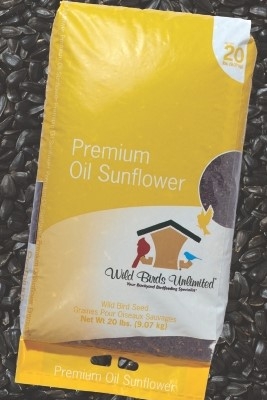 Up! Black Oil Sunflower Seeds (in the shell)
Up! Black Oil Sunflower Seeds (in the shell)
A favorite of almost all seed-eating birds, your feathered friends will happily fill up on our Premium Oil Sunflower bird seed. It's a great source of energy for the birds and 99% free of sticks, stems or other foreign matter so your feeders won't clog with debris. Oil sunflower has a high calorie/ounce ratio due to its high fat and protein content and its relatively thin shell. Among seed ingredients, oil sunflower attracts the greatest variety of small and large seed-eating birds. Studies by the U.S. Fish and Wildlife Service and the Cornell Laboratory of Ornithology have shown that most birds prefer oil sunflower seeds to both striped sunflower and white proso millet. Fill your feeders with this top-grade fuel, and watch the birds flock.
Available in 20-lb. bags.
Get More with Hulled Sunflower Chips
Get more birds for your bucks by offering sunflower seeds without their shells. No shells means no mess under your feeder. Hulled sunflower seeds have a high oil content and provide birds with an extra kick of energy. It's an ideal seed to offer in feeders near patios, sidewalks or balconies. Offering hulled sunflower is also cost efficient, because you're not paying for the shells that are not consumed.
Available in 20-lb. bags.
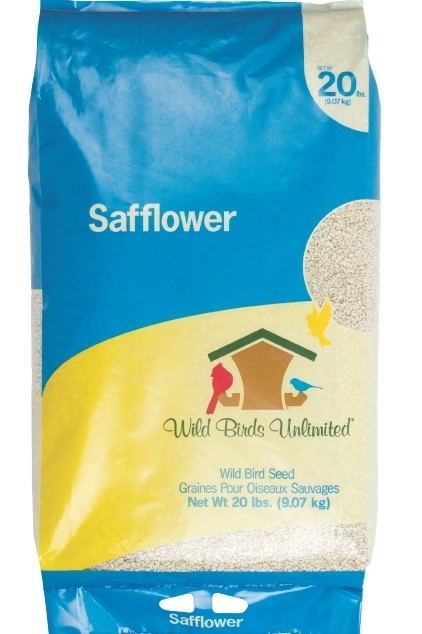
The Safflower Solution
Sunflower-eating birds love Safflower; squirrels and blackbirds typically don’t. If you are looking to be more exclusive with your bird feeding, Safflower may be the solution for you. Many of your favorite birds will enjoy safflower, yet blackbirds, grackles and squirrels typically don't. Safflower can be offered in hopper, platform or tube feeders, and it is especially helpful for window or deck feeders where blackbirds or squirrels may be a problem. Offer safflower gradually, mixing it with the seed blends you currently provide, and over time, you'll end up with a dining spot for all kinds of birds, including House Finches, woodpeckers, nuthatches and chickadees.
Available in 20 lb. bags.
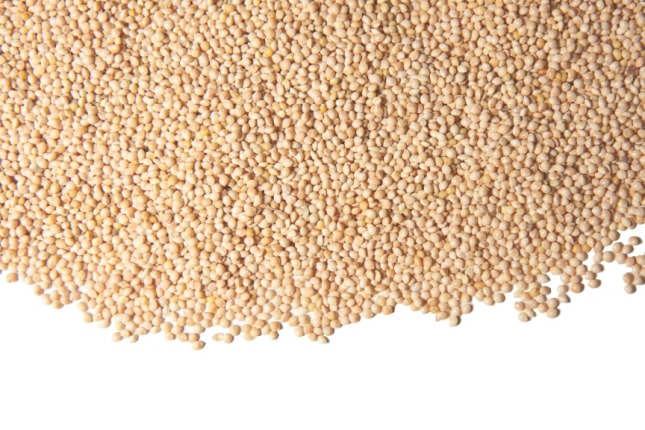
White Proso Millet
Millet is high in protein, but not high in fat (relative to sunflower, safflower and some of the other seeds). Millet is typically used in blends, and it attracts a variety of ground-feeding birds, including Mourning Doves, juncos and all types of sparrows. Smaller birds tend to crack open and remove the hull, while larger birds eat the grain hull and all.
Available in 20 lb. bags (new size)
Peanuts
Peanuts are a favorite food for many birds, and they’re a fast, easy option for backyard birders to refill feeders. Peanuts are high in fat and p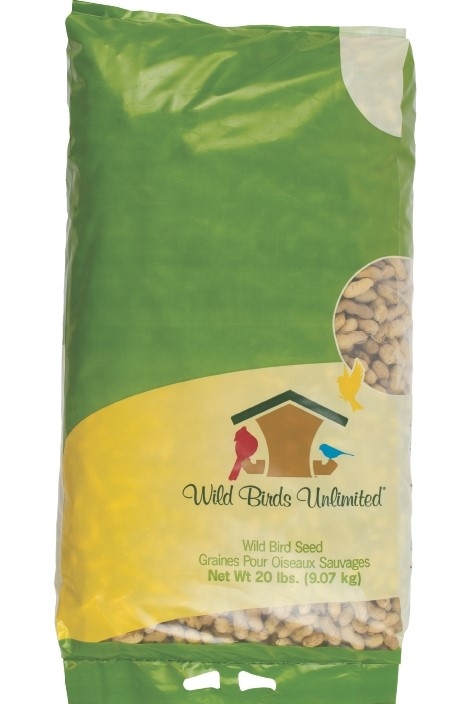 rotein and are an excellent source of energy and calories, especially during cold winters, and they're ideal for birds to tuck away and store for another day. There are several ways peanuts can be offered to backyard birds. Whole peanuts, either in the shell or just the hearts of the nuts, are popular with larger birds such as jays, ravens, crows, woodpeckers and grackles, while smaller birds may take the nut meats and pound or break them into smaller, bite-size pieces. Birds of all sizes will appreciate easier-to-eat peanut chunks and chips.
rotein and are an excellent source of energy and calories, especially during cold winters, and they're ideal for birds to tuck away and store for another day. There are several ways peanuts can be offered to backyard birds. Whole peanuts, either in the shell or just the hearts of the nuts, are popular with larger birds such as jays, ravens, crows, woodpeckers and grackles, while smaller birds may take the nut meats and pound or break them into smaller, bite-size pieces. Birds of all sizes will appreciate easier-to-eat peanut chunks and chips.
Because peanuts are so popular, specialized feeders make it easier to offer these treats in your backyard. A mesh peanut feeder will hold whole nuts and make the birds work to wrangle each nut out of the feeder – providing plenty of entertainment for backyard birders as well as making the supply last longer. Peanut chips can be offered in hopper feeders, and any types of peanuts can be added to a tray or platform feeder. It is important, however, not to offer too many peanuts at once – they are highly susceptible to mold and mildew, and can go rancid in just a few days in warm or moist climates. To avoid wasted, unappetizing nuts, only put out as many peanuts as the birds will consume in a day or two.


